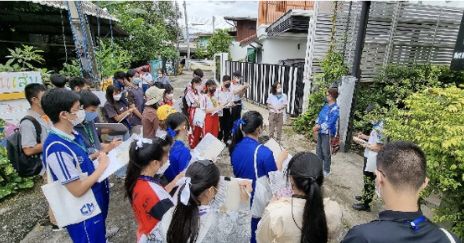โครงการกลไกการขับเคลื่อนเมืองเชียงใหม่เพื่อยกระดับการเป็นเครือข่ายเมืองแห่งการเรียนรู้ของ UNESCO กรอบวิจัย “เมืองแห่งการเรียนรู้” โดยหน่วยบริหารและจัดการทุนวิจัยและนวัตกรรมด้านการพัฒนาระดับพื้นที่ (บพท.) เริ่มโครงการตั้งแต่ 1 พ.ค 65 – 30 เม.ย. 66 โดยได้มีการตีพิมพ์เผยแพร่เรื่อง “สำรวจการก่อรูปทางความคิดและกลไกการขับเคลื่อนเชียงใหม่เมืองแห่งการเรียนรู้ด้วยชุมชน” “Exploring theoretical framework and driving mechanism in community-based Chiang Mai learning city”
This paper is part of the research project titled “local network for Chiang Mai learning city” received a grant from program management unit on area based development (PMU A) in 2021 under the framework of UNESCO’s learning city, which has Chiang Mai’s Municipality as the area of research. This article aims to elaborate the conceptualize framework and driving mechanisms by embracing Henry Lefebvre’s social space theory, to explore community and community space in terms of how people use as production of space. Moreover, there are classified these community formations into four categories, as are people, place, object, and memory which came up with the observation mapping and the data of these community formation. Which are selected into three communities for the specific research cases, which are namely, Kuan Kham Ma community, Pa Ha community, and Chang Moi community. Related activities and proposed driving mechanism have been conducted based on three different approaches of three sub-research projects. All team have worked together from the beginning before exploring differently later based on different emphasis on the learning processes such as; sub-research 1 focused on building the network and connectivity among community and civil society’s groups, sub-research 2 aimed to analyze the relationship between community and urban physical space and sub-research 3 explore how to implement the city’s lessons for the different groups of youth to identify the proper learning mechanisms. Through community’s resources and knowledge extracting process, the research argued that; (1) the structure of communities in municipal area is very fragile and weak due to the lack of continuity and the sense of belonging among those newcomers in the community which may affect the strength of the community, (2) the communities’ network is possible but difficult and progress slowly due to the lack of communication and (3) the communities need the plan for developing and caring community space which goes beyond the physical development system.
Keywords: community, social space, driving mechanism, Chiang Mai, learning city
The research project titled “local network for Chiang Mai learning city” aligns with SDG 4: Quality Education by promoting inclusive and equitable quality education and lifelong learning opportunities. It also connects with SDG 11: Sustainable Cities and Communities, particularly in terms of developing sustainable urban spaces that foster community engagement and social cohesion. Additionally, it relates to SDG 17: Partnerships for the Goals, as it emphasizes collaboration among community groups, civil society, and local authorities to enhance learning and development in the urban environment.
Please see the link below: PP.93-113

